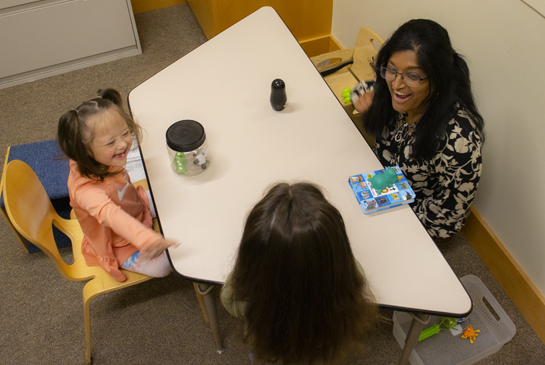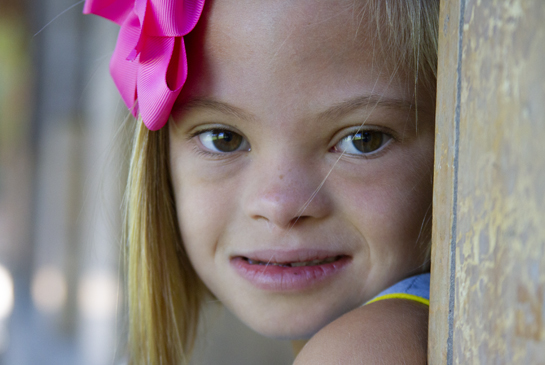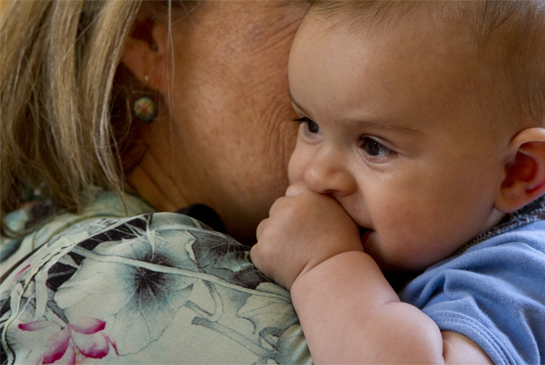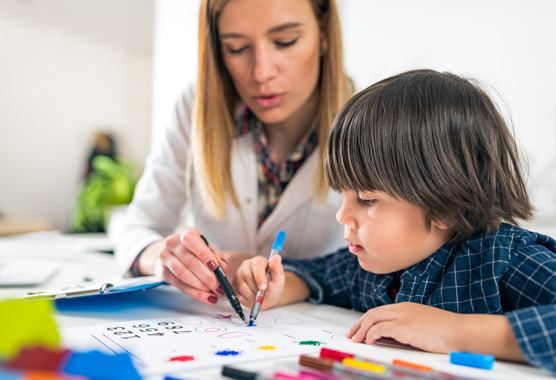Language Development Research
Empowering families through innovative research and knowledge.

About Our Research

Our research lab is trying to understand how language develops in children who have certain developmental disabilities like fragile X syndrome, Down syndrome, and autism. We've noticed that each condition has its own unique characteristics when it comes to language, with different areas where children may do well or struggle.
Right now, we're working on several projects to figure out the reasons behind language development over time. We want to know how biology, behavior, and the environment play a role in this process. For example, we are studying how differences in a specific gene called FMR1 can affect language skills in people with fragile X. We're also interested in finding out how parents can help support their children's language development. Additionally, we're looking into how difficulties with memory, problem-solving, understanding social situations, and other abilities can affect how quickly individuals with developmental disabilities learn language.
Our main goal is to use the knowledge we gain from our research to create better ways of helping people with these disabilities. We want to share our findings with families, educators, and speech-language clinicians so that they can provide improved support and therapy to individuals. We're also exploring ways to make language therapies more effective.
This study focuses on learning more about how young children with Down syndrome learn to communicate and develop language. In the future, what we learn could help create better ways to track how communication develops and improve how we monitor and support children with Down syndrome.
Who can participate in the study?
Children with a diagnosis of Down syndrome ages 1.5 - 4.5 years old.
What does the study involve?
Over 3 years, families will take part in:
In-person visits at the MIND Institute (3 total, every 18 months). During each visit:
- We will do play-based activities and developmental assessments with your child
- You’ll complete questionnaires about your child’s communication, behavior, and development
Telehealth Check-ins (11 total, every 3.5 months). Each session includes:
- An interview and a few questionnaires about your child’s communication
- A 15-minute video of you and your child playing/interacting naturally
What else is expected?
- Families will receive up to $480 for participation ($50 for each in-person visit and $30 for each telehealth session completed)
- Travel-related costs will be reimbursed (subject to UC Davis policies)
The study is looking at how language and executive function affect academic skills like literacy and social skills in school-age children assigned female at birth with autism or fragile X syndrome.
Who can participate?
Children assigned female at birth with:
- fragile X syndrome ages 8 - 12
- autism ages 8 - 12
What does the study involve?
- 2 visits to the MIND Institute over 2 years
- Your child will take part in activities looking at cognition, language, and other skills
- Caregivers are asked to participate in interviews and answer questionnaires about their child
What else is expected?
- Mileage and/or many other travel related expenses can be reimbursed depending on the project resources and university policy
- Caregivers will receive a report after completing the study including their child’s assessment results and general observations
- Families will receive up to $225 as a thank you for participating in the study
Contact the study coordinator at 916-703-0226 for more information.
What is the study about?
Our team is looking for ways to help English and Spanish speaking families be part of future treatment studies without the need to travel to a clinic or research center.
What does participation involve?
The caregiver will be trained to complete a language activity with the individual with Down syndrome. All training will be conducted in your home using telecommunication technology (e.g., Zoom) through written materials, video examples, and real-time coaching over 16 weeks. We will provide you with materials if needed during the training. You will also receive up to $100 for study completion.
Who can participate?
We are enrolling families with individuals with Down syndrome for this telehealth study. The study can be completed in either English or Spanish.
Families may qualify if the individual with Down syndrome:
- is between 12.00 – 35.99 years old
- speaks English or Spanish as their primary language
- speaks using 2 – 3 word phrases
Study recruitment complete.
¿De que se trata este estudio?
Nuestro equipo está buscando formas de ayudar a familias que hablan inglés y español a participar en estudios de tratamiento en el futuro sin la necesidad de viajar a una clínica o centro de investigación.
¿Qué implica la participación?
El compañero de investigación será entrenado para completar una actividad de lenguaje con la persona con síndrome de Down. Todo el entrenamiento se llevará a cabo en su hogar utilizando tecnología de para la comunicación (por ejemplo, Zoom) a través de materiales escritos, ejemplos en video y asesoramiento en tiempo real durante 16 semanas. Le proporcionaremos materiales si es necesario durante el entrenamiento.
¿quién puede participar?
Estamos enrolando familias de personas con Síndrome de Down para un estudio via telesalud. El estudio puede completarse en inglés o español. Las familais peuden calificar su la perosnas con Síndrome de Down:
- Tiene entre 12.00 – 35.99 años de edad
- Habla Inglés o Español como idiomas primarios
- Habla usando frases de 2 – 3 palabras
o Reclutamiento del estudio completo.
Down Syndrome Resources
Down syndrome is a condition in which a person has an extra chromosome. Chromosomes are small “packages” of genes in the body. They determine how a baby's body forms and functions as it grows during pregnancy and after birth.
Fragile X Resources
Fragile X syndrome is the most common inherited cause of intellectual disability and it is also the most common known genetic mutation associated with autism. The clinical features of fragile X range from mild emotional, sensory and/or learning problems to intellectual disabilities and autism.
Research Participant Registry
Our Research Participant Registry (RPR) is designed to match potential participants with the MIND Institute's human research studies. Your participation in research plays a vital role in improving awareness, understanding, prevention, care, and treatment of neurodevelopmental disabilities.
For more information about the Language Development Lab, please email hs-language.research@ucdavis.edu.




